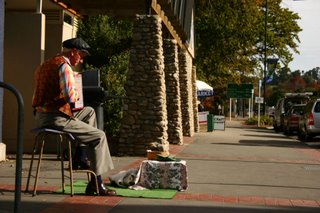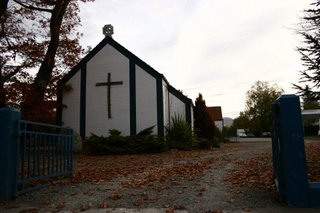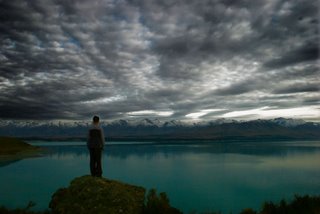Score To a Photo 2
This was a contest organised by Concord Designs and All Media Studios in June 2006. Entrants were given three photos to inspire a piece, the three pictures should create a story for each composer which is reflected in their piece. The track i came up with was entitled 'The Accordianist's Tale', this is currently still available as a download courtesy of Concord Designs..
Listen
PHOTO ONE: 00.00 - 02.08

... The accordianist plays for money in the streets (represented musically by chords and melody on electric fan organ). His thoughts drift between his music and the sounds around him (the present) to thoughts of the past. His hands are shakey and the old accordian doesn't respond in his hands as it used to. Sounds of the streets (recorded to Minidisc in Amsterdam, April 2005) come and go as his thoughts of the past gradually take presidence.
PHOTO TWO: 02.08 - 02.28

... The accordianist recalls his wife's death and funeral, he can hear his accordian reflected in the church organ as it doubles his melody, he can hear the minister at the service (recorded to MD at the Old Church in Amsterdam, April 2005). He has accepted her death, but is still brings him great sadness.
PHOTO THREE: 02.28 - END

(Enter acoustic bass guitar, cymbal, tom and acoustic guitar)
... The accordianist recalls the last time he was alone and happy. He is alone again now, but can't imagine feeling that exhalted joy and freedom again as he did that day on the shore. It brings him sadness, but emotions are like a dull sensation to him now at this age, few great highs, few great lows. His thoughts gradually return to the street, to his old fingers, to the way things are now.
Listen
PHOTO ONE: 00.00 - 02.08

... The accordianist plays for money in the streets (represented musically by chords and melody on electric fan organ). His thoughts drift between his music and the sounds around him (the present) to thoughts of the past. His hands are shakey and the old accordian doesn't respond in his hands as it used to. Sounds of the streets (recorded to Minidisc in Amsterdam, April 2005) come and go as his thoughts of the past gradually take presidence.
PHOTO TWO: 02.08 - 02.28

... The accordianist recalls his wife's death and funeral, he can hear his accordian reflected in the church organ as it doubles his melody, he can hear the minister at the service (recorded to MD at the Old Church in Amsterdam, April 2005). He has accepted her death, but is still brings him great sadness.
PHOTO THREE: 02.28 - END

(Enter acoustic bass guitar, cymbal, tom and acoustic guitar)
... The accordianist recalls the last time he was alone and happy. He is alone again now, but can't imagine feeling that exhalted joy and freedom again as he did that day on the shore. It brings him sadness, but emotions are like a dull sensation to him now at this age, few great highs, few great lows. His thoughts gradually return to the street, to his old fingers, to the way things are now.

